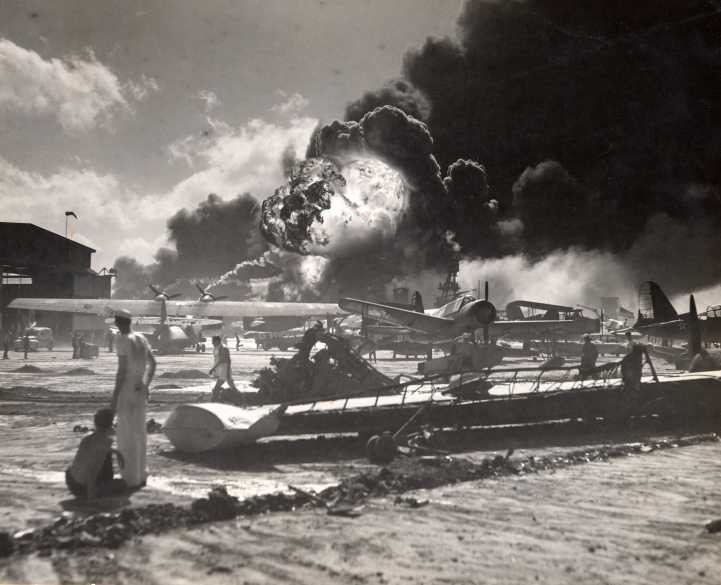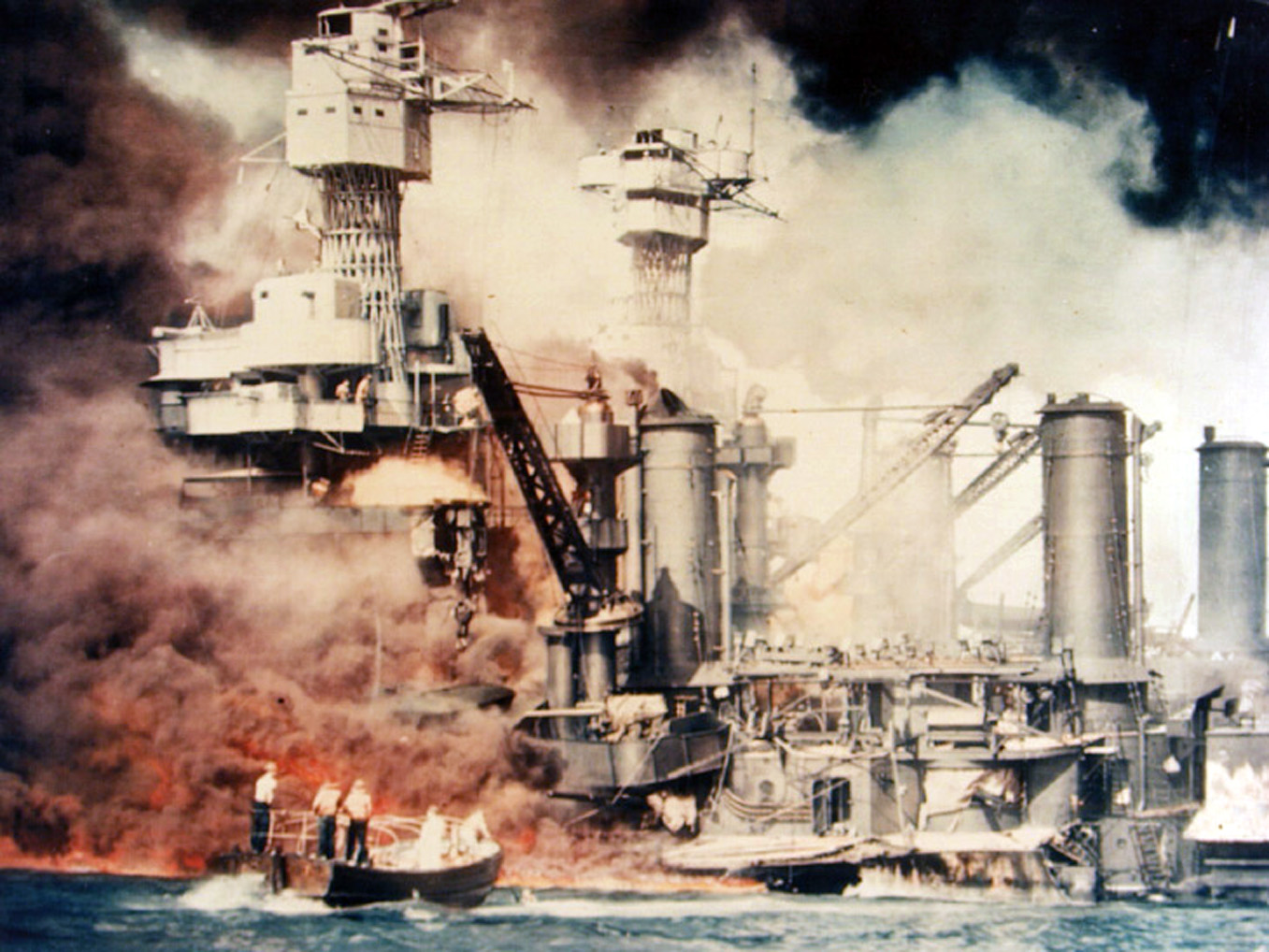On December 7, 1941, the Japanese launched a surprise attack against the U.S. Pacific Fleet anchored at Pearl Harbor. 2,403 American civilians and military personnel were killed and 1,178 wounded. Two battleships and 188 aircraft were destroyed, and many other ships and aircraft were badly damaged. The next day, Congress declared war against Japan; a few days later, Nazi Germany and Italy declared war against the United States.
The attack against Pearl Harbor and the declarations of war caused a wave of patriotism across the US. Many men signed up to serve in the armed forces, and women and children did whatever they could to support the war effort at home. Many of the Manhattan Project veterans we have interviewed for our “Voices of the Manhattan Project” website recall the impact Pearl Harbor had, both on their own life and the US at large.
Bill Tewes: Before Pearl Harbor, this country was very divided. There was an extremely strong movement, mainly Republican, who were isolationists: “Do not send our boys to die in Europe.” Then we had extremists like Charles Lindbergh and Father Coughlin. In north Jersey every Saturday and Sunday, the German American Bund would get out and march.
On December 7th, I had gone home, which was Livingston, New Jersey. Driving back around 1:30 PM, I turned the radio on and I heard this: “Japanese were bombing Pearl Harbor.” I pulled off to the side and listened. And it was apparent that they had a very successful operation. We had essentially lost all the capital ships and numerous lives.
The most significant thing was the announcement that President Roosevelt would speak to the nation, I think it was about 11:30 AM on December 8. Most of us remember where we were when he gave “The date that will live in infamy” speech. I thought for quite a while that that speech had been designed to counteract the division that existed in this country. But in reading about it, one of his aides mentioned that when he [President Roosevelt] came into Congress, “There were cheers. In the past there had been cheers, which were coming from the Democratic side. This time everybody was cheering.”
 Kay Manley: People don’t realize what it was like right after Pearl Harbor. Pearl Harbor was a thing that galvanized the country, absolutely. Everybody was so shocked by that, dismayed that the country’s protection turn out to be so bad. It was bad. Pearl Harbor should never have happened. If they had been on the lookout as they should have been, it should never have happened. But it did, and the country was so shocked.
Kay Manley: People don’t realize what it was like right after Pearl Harbor. Pearl Harbor was a thing that galvanized the country, absolutely. Everybody was so shocked by that, dismayed that the country’s protection turn out to be so bad. It was bad. Pearl Harbor should never have happened. If they had been on the lookout as they should have been, it should never have happened. But it did, and the country was so shocked.
I remember the day of Pearl Harbor very clearly. A couple of days afterward, my husband received a phone call from Leo Szilard, asking if he would come to Chicago to help with an effort that would have an effect on the war. This was at Christmastime, just after Pearl Harbor. I said, “Yes, we’ll go. If you want to do this, that’s the thing to do. We’ll go.” And we did. We packed up, right away, that January, and moved to Chicago.
George Allen: We went to New Orleans that morning in the car, just driving around. About 11:00 in the morning, the radio was going, and it broke in and announced [the attack]. I thought it was some sort of a drama they were putting on it, but it was not, of course. My dad said, “We’re going home,” which we did. On the way back home, there were servicemen lined along the highway trying to get back to their bases, and we picked up four of them. I’m sure some of those were killed because they were the ones that bore the brunt; they were already in the service.
Nick Salazar: I remember being at my grandmother’s house. We were having lunch. I remember news coming on the radio that Japan had attacked Pearl Harbor, and we were at war. Of course, my grandmother and my mother and everybody started crying, only because my uncle was at that age of being able to be inducted into the service. He did, and unfortunately, he went through some real hard times. He came back very sick and eventually died. Those were very, very, very hard times.
Herman Snyder: You know, youngsters my age, when their country gets blasted like we were in Pearl Harbor, we get angry. We want to fight. I was just in my freshman year at the university, but a lot of the guys finished that semester and took off.
Dimas Chavez: I was born in the central part in New Mexico, a small little ranching, farming, Mexican-American community by the name of Thoreau, which is not too far from Albuquerque. My father was one of twelve and he and his brothers and sisters helped my grandfather run three ranches of which they had about four thousand head of sheep. It was just a wonderful period of time as a child—until December 7th of 1941, when our entire world was basically kind of turned upside down.
The bombing of Pearl Harbor drained our community of all the young men. A lot of the farms, crops and animals suffered as a result of the men having to go off to war. Uncle Jose went to Germany, was wounded quite badly and sent home with Purple Heart. Uncle Tivi went to Japan. And my uncle Feliciano Chavez went to North Africa and fought as a foot soldier with General Patton.
Graydon Whitman: The Manhattan Project has been described as being the equivalent of building a Panama Canal every year for three years. It involved expenditure of 2.1 billion dollars back then. We were fighting a war in the Pacific, the Atlantic, and Africa, all the seas; it was a world war. And we did the Manhattan Project on top of it all. It’s overwhelming when you stop and think about the probability of doing all of that successfully.
A Japanese admiral said that Pearl Harbor awakened a giant. Well, he was right. This country has tremendous capability. I’ve always been proud of it, always will be, just to have been a small part of it. It was exciting in many ways to do things that had never been done before, even though we didn’t know exactly what we were doing at the time.
Dorothy Wilkinson: I came right out of high school when I graduated because I had a brother killed on the Arizona at Pearl Harbor, and I thought that I would like to do something for the war effort. A man came to my high school in west Tennessee, and I took an exam of sorts. I do not remember it too well, but he accepted me. I think that they would accept anything at that time, because they wanted to get everything done.






_burning_after_the_Japanese_attack_on_Pearl_Harbor_-_NARA_195617_-_Edit_0.jpg)